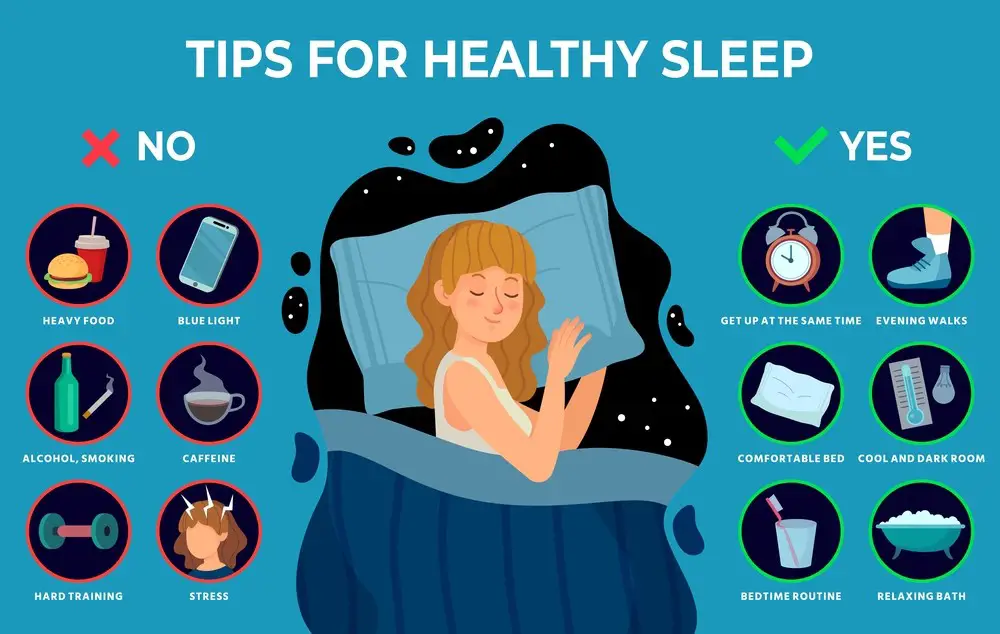As a BetterHelp affiliate, we receive compensation from BetterHelp if you purchase products or services through the links provided
Have you ever found yourself lying in bed, but feeling like you’re in a sauna instead, wondering why you’re overheating while you sleep? You’re not alone. Many of us have experienced that toasty feeling in the middle of the night, but it’s not just about discomfort. The issue runs much deeper than that.
Sleep is not just a luxury, it’s a necessity. It is the foundation of our mental and physical well-being. Therefore, when something interferes with the quality of our rest, such as unexpected spikes in body temperature, it can throw a wrench into the finely tuned machinery of our lives. So, discovering the reason behind those sweaty, sleepless nights is more than just a search for comfort. It is a deep dive into understanding ourselves and the places we call home.
Common Causes Of Feeling Hot When Sleeping
You may wonder, “Why do I get hot when I sleep?”. Feeling hot while sleeping is a common issue that can disrupt sleep and affect overall comfort. Several factors can contribute to this sensation, and understanding these common causes is essential for finding effective solutions:
- High Room Temperature
A warm or overheated room can significantly contribute to feeling hot while sleeping. Our body temperature naturally decreases during sleep, but a hot room can hinder this cooling process.
Also Read: Achieving Tranquil Sleep: A Path to Balanced Well-Being
- Bedding Material
The type of bedding material you use can impact your comfort. Fabrics like flannel and heavy blankets can trap heat, making you feel hot when you sleep.
- Night Sweats
Night sweats are excessive sweating during sleep, often linked to hormonal changes, medications, or certain underlying medical conditions. They can lead to feeling hot and drenched.

- Metabolism and Hormones
Your body’s metabolic rate and hormone levels can influence internal temperature regulation. Hormonal fluctuations, such as those during menopause, can lead to temperature issues during sleep, as records show that approximately 75 percent of women who experience menopause also experience hot flashes.
- Medical Conditions
Various medical conditions, such as fever, hyperthyroidism, or infections, can cause elevated body temperatures, causing you to feel hot during sleep.
- Alcohol and Diet
Consumption of alcohol or heavy meals before bedtime can affect body temperature regulation. Alcohol can cause vasodilation, leading to feeling hot, while digestion of large meals may generate heat.
Also Read: Sleep Bras: Essential Comfort for Nighttime Wear
- Stress and Anxiety
High stress and anxiety levels can trigger the body’s “fight or flight” response, increasing core body temperature and making it difficult to have a good night’s sleep.

- Mattress Quality
An old or inadequate mattress may not provide proper support or ventilation, leading to discomfort and heat retention and feeling hot during sleep.
Also Read: How to Sleep with a Prolapsed Bladder: Expert Tips for a Restful Night
- Bedroom Environment
Poor bedroom design and organization can impact airflow and bedroom temperature control. Clutter and inadequate ventilation can contribute to feeling hot.
Understanding these common causes of feeling hot while sleeping is crucial for improving sleep quality and overall comfort. By identifying and addressing the factors contributing to nighttime overheating, you can take proactive steps to ensure a cooler, more restful night’s sleep.
Tips For Staying Cool At Night
Whether you’re naturally a hot sleeper or you struggle with poor sleep in hot weather, here are some practical tips for staying cool at night and improving your sleep comfort:
- Choose the Right Bedding: Opt for lightweight, breathable bedding materials like cotton or linen. These fabrics help regulate temperature and wick away moisture.
- Adjust Room Temperature: Set your thermostat to a cooler temperature (ideally around 65-70°F or 18-21°C) to create a comfortable environment for you to fall asleep.
- Utilize Fans and Air Conditioning: Use fans or air conditioning to improve air circulation and maintain a cooler room temperature.
- Keep Your Feet Cool: Your extremities play a role in temperature regulation. Try wearing breathable socks or going barefoot if it’s comfortable.
- Take a Cool Shower: A lukewarm or cool shower can lower your body heat and help you feel refreshed before bedtime.
- Stay Hydrated: Drink water throughout the day to stay hydrated, but avoid excessive consumption right before bedtime to prevent nighttime trips to the bathroom.
- Select the Right Pajamas: Wear lightweight, loose-fitting pajamas made of natural, breathable materials like cotton. Avoid heavy, insulating fabrics.
- Limit Alcohol and Heavy Meals: Refrain from consuming alcohol and heavy, spicy, or fatty foods close to bedtime, as they can raise body temperature and disrupt sleep.
Also Read: Why You Should Lower The Thermostat In Your Bedroom if You Want to Sleep Better
- Create Cross-Ventilation: If possible, open windows on opposite sides of the room to encourage cross-ventilation and better airflow.
- Block Out External Heat Sources: Use blackout curtains or blinds to minimize heat from outdoor sources like sunlight or streetlights.
- Consider a Sleep Mask and Earplugs: Sometimes, a sleep mask and earplugs can help you sleep better by blocking out disturbances that can lead to stress and elevated body temperature.
- Relaxation Techniques: Practice relaxation exercises, such as deep breathing or meditation, to reduce stress and anxiety that can contribute to overheating.
- Limit Electronic Devices: Reduce exposure to screens and electronic devices before bedtime, as they emit heat and can interfere with the body’s natural sleep-wake cycle.
- Keep Bedroom Clutter-Free: Maintain an organized and clutter-free bedroom for better air circulation and a more comfortable sleep environment.
Remember that everyone’s ideal sleeping temperature may vary, so it may take some experimentation to find the best strategies for you. The goal is to create a sleep-friendly environment that promotes a cooler and more comfortable night’s rest.
Choosing The Right Bedding And Sleepwear
- Breathable Fabrics
Opting for bedding and sleepwear made from breathable fabrics is essential for temperature regulation during sleep. Breathable fabrics like cotton and linen promote a cooler sleep environment by allowing excess heat to escape. They also wick away moisture, keeping you dry and comfortable overnight. Look for bedding and sleepwear labels that specify breathable materials like cotton, a natural choice for its ability to keep you comfortable and warm when you sleep.
- Cooling Mattress Toppers
Cooling mattress toppers often incorporate cooling gel or phase-change materials that actively dissipate heat from your body. They can help maintain a more excellent sleep surface and provide added comfort. An advanced cooling mattress can also help regulate your skin temperature. When selecting a cooling mattress topper, consider factors such as thickness, material, and the specific cooling technology to ensure it suits your preferences.
- Lightweight Sleepwear
Lightweight sleepwear from breathable and airy fabrics like cotton allows for better airflow and temperature regulation. It reduces the risk of overheating and promotes more restful sleep. Choose loose-fitting, breathable sleepwear made from natural fibers like cotton or modal. Avoid sleepwear that is too tight or made from heavy, heat-retaining materials.
Also Read: How to Sleep Comfortably in the Backseat of a Car: Expert Tips for a Restful Journey
By prioritizing breathable fabrics, considering cooling mattress toppers, and opting for lightweight sleepwear, you can create an optimal sleep environment that promotes a cooler and more comfortable night’s sleep. These choices play a crucial role in ensuring that your body temperature remains regulated throughout the night, enhancing your overall sleep quality and reducing heat when you sleep.

Signs It’s Time to Consult a Professional
Feeling hot while sleeping can be a nuisance for some, but it could be a sign of a deeper issue for others. So, how do you know when it’s time to get some expert advice?
- Persistent Night Sweats: It might not be just the room temperature if you consistently wake up drenched in sweat.
- Disrupted Sleep: Tossing and turning becomes the norm, and a good night’s sleep seems like a distant dream.
- Daytime Fatigue: Feeling perpetually tired during the day despite lying in bed all night is a glaring red flag.
- Mood Fluctuations: Lack of sleep can lead to mood swings, irritability, and depression.
- Other Symptoms: If you experience additional symptoms like heart palpitations, it could indicate a more severe condition.
Setting Realistic Goals
Recognizing a problem is just the first step; now, it’s time to take action. But before you dive in, you should establish some achievable goals. What are you aiming for?
- Consistent Temperature: The goal is not just to sleep cooler but to maintain a stable body temperature throughout the night.
- Quality Sleep: Getting those precious 7-8 hours of uninterrupted sleep should be a priority.
- Improved Well-Being: Feeling well-rested during the day and improving overall mood and productivity.
Tracking Your Progress
They say a journey of a thousand miles starts with a single step. But how do you know you’re heading in the right direction?
- Sleep Journal: Keeping a detailed record of your sleep patterns can help you identify trends and improvements.
- Physical Check-ups: Regular medical tests can show if an underlying issue is improving or worsening.
- Daytime Alertness: Notice your energy levels during the day. Do you feel more awake and alert?
- Consult Progress Reports: If you’re working with a healthcare provider, frequent check-ins will help monitor your progress effectively.
It’s important to celebrate the small wins along the way. Even seemingly trivial improvements can be monumental when it comes to sleep. After all, a better night’s sleep is the gateway to a more fulfilling life.
Frequently Asked Questions (FAQs)

Is feeling hot at night a common issue, or could it indicate an underlying problem?
Feeling hot at night can be a common issue due to various factors like room temperature and bedding. However, it could indicate an underlying problem if it persists or is accompanied by other symptoms.
What are some quick tips for cooling down when I feel too hot to sleep?
Quick tips for cooling down when feeling too hot to sleep include using lighter bedding, adjusting the room temperature, taking a cool shower, and staying hydrated.
Can hot sleeping lead to disrupted sleep patterns or insomnia?
Yes, hot sleeping can lead to disrupted sleep patterns or insomnia, as excessive heat can make it challenging to fall and stay asleep comfortably.
- Left Arm Pain and Anxiety: Understanding the Relationship - November 23, 2023
- Anxiety Paralysis: Coping with Overwhelming Stress - November 23, 2023
- Anxious vs. Nervous: Differentiating Emotions and Responses - November 15, 2023
This site contains affiliate links to products. We will receive a commission for purchases made through these links.



